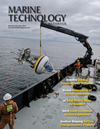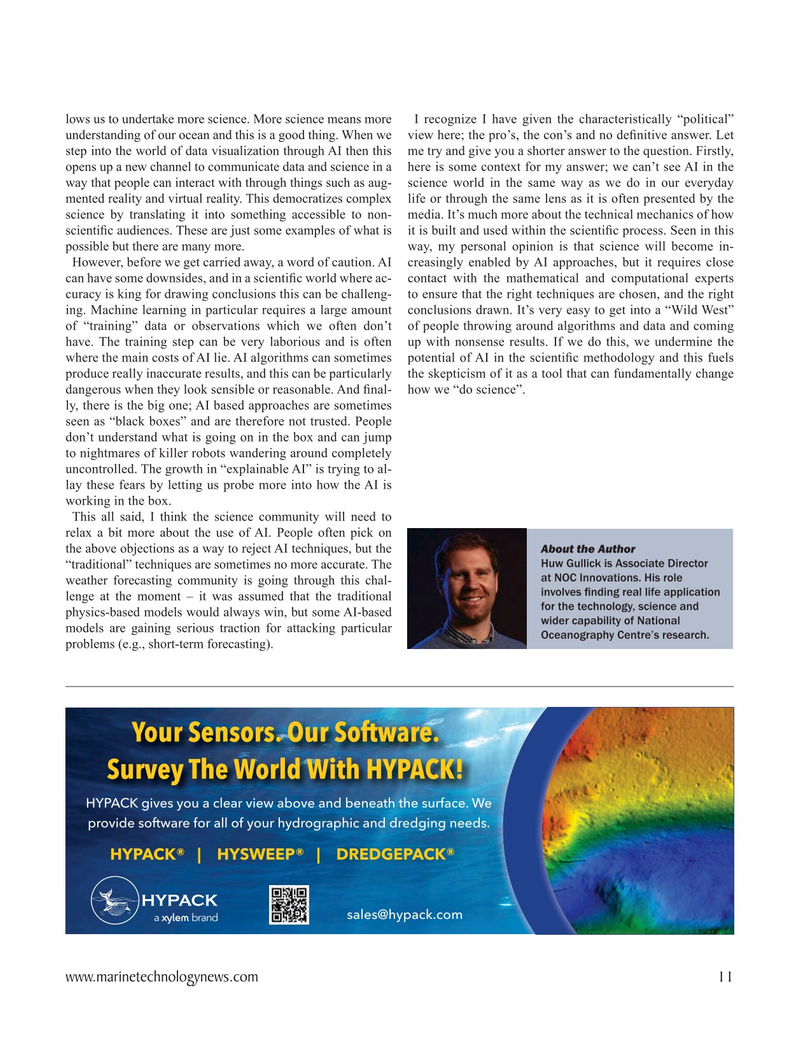
Page 11: of Marine Technology Magazine (November 2023)
Read this page in Pdf, Flash or Html5 edition of November 2023 Marine Technology Magazine
lows us to undertake more science. More science means more I recognize I have given the characteristically “political” understanding of our ocean and this is a good thing. When we view here; the pro’s, the con’s and no de? nitive answer. Let step into the world of data visualization through AI then this me try and give you a shorter answer to the question. Firstly, opens up a new channel to communicate data and science in a here is some context for my answer; we can’t see AI in the way that people can interact with through things such as aug- science world in the same way as we do in our everyday mented reality and virtual reality. This democratizes complex life or through the same lens as it is often presented by the science by translating it into something accessible to non- media. It’s much more about the technical mechanics of how scienti? c audiences. These are just some examples of what is it is built and used within the scienti? c process. Seen in this possible but there are many more. way, my personal opinion is that science will become in-
However, before we get carried away, a word of caution. AI creasingly enabled by AI approaches, but it requires close can have some downsides, and in a scienti? c world where ac- contact with the mathematical and computational experts curacy is king for drawing conclusions this can be challeng- to ensure that the right techniques are chosen, and the right ing. Machine learning in particular requires a large amount conclusions drawn. It’s very easy to get into a “Wild West” of “training” data or observations which we often don’t of people throwing around algorithms and data and coming have. The training step can be very laborious and is often up with nonsense results. If we do this, we undermine the where the main costs of AI lie. AI algorithms can sometimes potential of AI in the scienti? c methodology and this fuels produce really inaccurate results, and this can be particularly the skepticism of it as a tool that can fundamentally change dangerous when they look sensible or reasonable. And ? nal- how we “do science”.
ly, there is the big one; AI based approaches are sometimes seen as “black boxes” and are therefore not trusted. People don’t understand what is going on in the box and can jump to nightmares of killer robots wandering around completely uncontrolled. The growth in “explainable AI” is trying to al- lay these fears by letting us probe more into how the AI is working in the box.
This all said, I think the science community will need to relax a bit more about the use of AI. People often pick on the above objections as a way to reject AI techniques, but the
About the Author
Huw Gullick is Associate Director “traditional” techniques are sometimes no more accurate. The at NOC Innovations. His role weather forecasting community is going through this chal- involves ? nding real life application lenge at the moment – it was assumed that the traditional for the technology, science and physics-based models would always win, but some AI-based wider capability of National models are gaining serious traction for attacking particular
Oceanography Centre’s research.
problems (e.g., short-term forecasting).
Your Sensors. Our Software.
Survey The World With HYPACK!
HYPACK gives you a clear view above and beneath the surface. We provide software for all of your hydrographic and dredging needs.
HYPACK® | HYSWEEP® | DREDGEPACK® [email protected] www.marinetechnologynews.com 11
MTR #8 (1-17).indd 11 11/28/2023 11:13:13 AM

 10
10

 12
12
